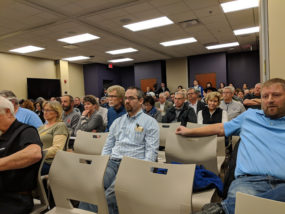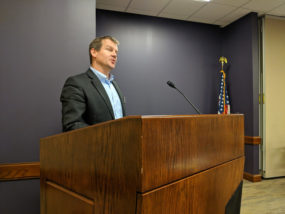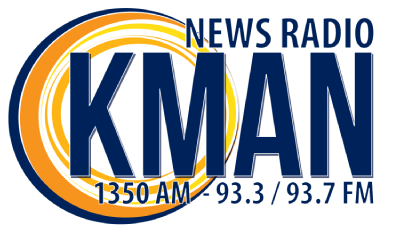
Agricultural workers from around the state of Kansas gathered at the Kansas Department of Agriculture for a public hearing for the proposed industrial hemp regulations.
KDA Hearing Officer Kelly Navinsky-Wenzl started the meeting with summing up the proposed regulations for the Industrial Hemp Research Program. She then opened the floor up to the public to make any comments on the regulations they had issues with.
One of the members of the public was Rick Gash who was a representative of the Hemp Development Group. He said he had issue with the costs associated with licensing. According to the regulations, licensees will have to pay $200 for each license sought, $1,000-$3,000 for primary licenses, $250 for each laboratory test, and $750 for any changes to the license.
“The regulation of charging our farmers, who are in a depressed market currently, $1,000 to grow something that is seen as a commodity all over the world, should be subsidized to the farmers to grow,” said Gash.
Taylor Brooks, who represented himself, said the state is falling behind in this field comparing Kansas to radio while the rest of the country is social media.
“You look at other states when it comes to hemp, with all these regulations for Kansas, we should be licensing everyone who grows other crops because essentially that’s what we’re doing,” said Brooks.
Brooks also brought up the issue that if a hemp crop’s THC level is too high at the time of inspection, then the whole crop must be destroyed.
Other issues brought up by the public included identifying all equipment, individuals, and data when applying for a license. Critiques of this regulation from the public stated that there may be alterations during the middle of harvesting like hiring a new worker or renting new equipment. This would then have the licensee charged the $750.

After the KDA board heard from the public, KDA Plant Protection and Weed Control Program Director Jeff Vogel addressed the crow and spoke about were these regulations were coming from. He said these regulations were created in compliance with the 2014 farm bill, since this was before the 2018 farm bill was passed by the legislature.
“This is a research based program allowing research to be done under the department alone or with coordination with universities,” said Vogel.
He also added that if they were to change the regulations in accordance with the new 2018 farm bill, it would require a change in state policy and a new state statute.
After Vogel’s comments, Navinsky-Wenzl closed the public hearing.


